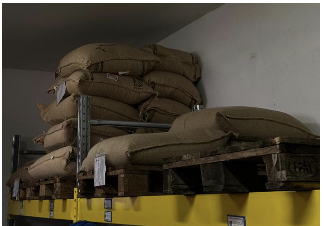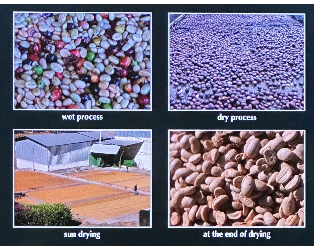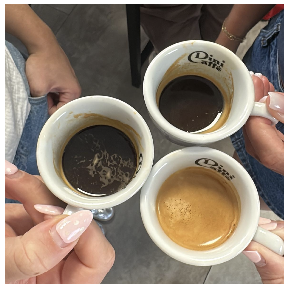A Morning at Dini Caffé: From Bean to Cup – Inside Florence’s Historic Coffee Roastery
By: Sawyer Pendergast, Emma Kelly, Jules Lee
Visited on September 17, 2025
In Italian culture, coffee is not just a caffeine boost, it is a way of life. As study abroad students in Italy, we have come to learn that coffee is not just a taste that people crave, or a caffeine boost people are addicted to, coffee is a way to embed yourself in a social experience. One day, after I had had a long day of class, I found myself at a coffee shop to order a cappuccino; however, I received weird looks from the barista. Later that day, I came to find that cappuccino is typically consumed during morning hours in Italy. I never knew there was aspecific time of day for different assortments of coffee.

Unlike the United States, in Italy, coffee is very reasonably priced, because it is not seen as a luxury item. After learning more about coffee in Italy from our own interactions, we had the pleasure of learning the way coffee is produced at the Dini Caffe.
The first thing we learned about during our visit to Dini Caffe, was the complex process thatcomes with coffee production. First, we discussed the steps necessary for a coffee bean to be ready for consumption. The first step being the wet process; where the beans are washed toremove any residue that may have remained from the plant. The wet process could take up to a week to complete, and following the wet process is the drying process. After the beans are washed, they are set to dry before the bean is removed. After the drying process, the beans are extracted and put in the sun to receive the nutrients needed to ensure the rich flavor that consumers crave. The entirety of the drying process varies, but typically takes a couple of weeks to undergo this process.

As a study abroad student, we have also learned how Italians prioritize correct disposal of food, plastic, glass and compost when the time comes to take out the trash. The correct disposal of these items should be done everywhere in the world; however Italy particularly takes pride in ensuring garbage is properly disposed of, to minimize waste created. After our visit to the Dini Caffe, we learned about their mission towards sustainability. All of their packaging is compostable, and all of the ink used on the packaging is water-based, making it more eco friendly.At the end of the visit, we had the pleasure of sampling the coffee produced at the Dini Caffe, and guessing the different aromas. The woman who took us around the facility is a professional coffee taster, meaning she is responsible for more than just the overall taste of the coffee, but also the aroma, aftertaste, color, etc. Coffee can be harvested correctly, but may not always be brewed correctly, meaning a barista can ruin a good coffee bean, simply by the way they roast it.

Dini Caffe is not your average coffee shop. They are located inside of ancient walls, and offer a wide variety of knowledge and quality coffee. Not only did we get to learn more about the cafe’s roots, but also more about coffee as a whole. Make sure during your next time in Florence, that you pay a visit to the Dini Caffe. The staff was amazing, family oriented, and super friendly. Go to Dini Caffe to immerse yourself deeper with Italian culture and make coffee your way of life!
